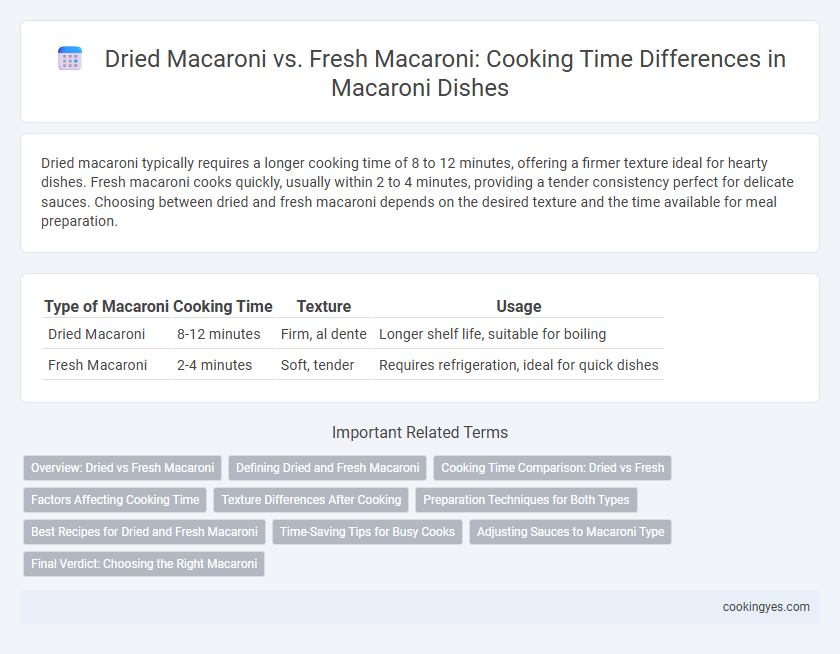Dried macaroni typically requires a longer cooking time of 8 to 12 minutes, offering a firmer texture ideal for hearty dishes. Fresh macaroni cooks quickly, usually within 2 to 4 minutes, providing a tender consistency perfect for delicate sauces. Choosing between dried and fresh macaroni depends on the desired texture and the time available for meal preparation.
Table of Comparison
| Type of Macaroni | Cooking Time | Texture | Usage |
|---|---|---|---|
| Dried Macaroni | 8-12 minutes | Firm, al dente | Longer shelf life, suitable for boiling |
| Fresh Macaroni | 2-4 minutes | Soft, tender | Requires refrigeration, ideal for quick dishes |
Overview: Dried vs Fresh Macaroni
Dried macaroni typically requires 8 to 12 minutes of boiling due to its low moisture content, while fresh macaroni cooks much faster, usually in 2 to 4 minutes, because of its higher moisture level. Dried macaroni offers longer shelf life and firmer texture, making it ideal for recipes needing prolonged cooking, whereas fresh macaroni provides a tender, delicate bite perfect for quick dishes. Understanding these differences helps optimize cooking time and texture based on the recipe's requirements.
Defining Dried and Fresh Macaroni
Dried macaroni consists of pasta that has been dehydrated, allowing it to have a longer shelf life and requiring a longer cooking time, typically around 8 to 12 minutes. Fresh macaroni is made from fresh dough that has not been dried, resulting in a shorter cooking time of approximately 2 to 4 minutes due to its higher moisture content. The differences in moisture levels and production methods directly impact the texture, shelf stability, and preparation speed of both dried and fresh macaroni varieties.
Cooking Time Comparison: Dried vs Fresh
Dried macaroni typically requires 8 to 12 minutes of boiling to reach the ideal al dente texture, while fresh macaroni cooks significantly faster, usually within 2 to 4 minutes. The denser composition of dried pasta results in longer cooking times, making it ideal for recipes where pasta must maintain shape and firmness under rich sauces. Fresh macaroni's higher moisture content allows for quicker cooking but can become mushy if overcooked, making timing critical for desired texture.
Factors Affecting Cooking Time
Dried macaroni generally requires 8 to 12 minutes to cook, while fresh macaroni cooks significantly faster, often in just 2 to 4 minutes. Factors affecting cooking time include moisture content, pasta thickness, and the type of flour used; dried pasta is denser due to less moisture, resulting in longer cooking duration. Water temperature and altitude also influence cooking time, with higher altitudes potentially increasing the time needed to reach optimal pasta texture.
Texture Differences After Cooking
Dried macaroni requires a longer cooking time, typically 8-12 minutes, resulting in a firmer, chewier texture compared to fresh macaroni, which cooks in 2-4 minutes and yields a softer, more delicate bite. The denser structure of dried macaroni maintains its shape better in hearty sauces, while fresh macaroni absorbs flavors quickly due to its tender texture. Pasta chefs often select dried macaroni for robust dishes needing al dente firmness, whereas fresh macaroni complements light, creamy sauces with its smooth consistency.
Preparation Techniques for Both Types
Dried macaroni requires boiling in salted water for 8-12 minutes, with occasional stirring to prevent clumping, while fresh macaroni cooks faster, typically in 2-4 minutes due to higher moisture content. Proper preparation of dried macaroni includes soaking or parboiling to reduce cooking time and ensure even texture, whereas fresh macaroni benefits from gentle handling and brief cooking to maintain its tender consistency. Both types should be drained immediately after cooking and rinsed under cold water to halt the cooking process and preserve optimal texture.
Best Recipes for Dried and Fresh Macaroni
Dried macaroni typically requires 8 to 12 minutes of boiling, making it ideal for baked dishes and casseroles where a firmer texture holds well. Fresh macaroni cooks much faster, around 2 to 4 minutes, perfect for creamy, delicate sauces like Alfredo or carbonara that benefit from its tender bite. Recipes such as classic macaroni and cheese suit dried pasta, while fresh macaroni shines in quick sautes or soups where swift cooking preserves its softness.
Time-Saving Tips for Busy Cooks
Dried macaroni typically requires 8 to 12 minutes of boiling, while fresh macaroni cooks in just 2 to 4 minutes, making it a quicker option for busy cooks. To save time, pre-soak dried macaroni in water for 30 minutes, reducing its cooking time significantly. Using fresh macaroni or soaking dried varieties can streamline meal preparation without sacrificing texture or taste.
Adjusting Sauces to Macaroni Type
Dried macaroni requires longer cooking times, typically 8-12 minutes, making it ideal for hearty, slow-simmered sauces that fully develop flavor. Fresh macaroni cooks rapidly in 2-4 minutes, best paired with delicate, lighter sauces that highlight its tender texture. Adjust sauce consistency and cooking method to complement the firmness and absorption rate of the chosen macaroni type for optimal taste and texture balance.
Final Verdict: Choosing the Right Macaroni
Dried macaroni typically requires 8 to 12 minutes of boiling, offering a firm texture and longer shelf life, while fresh macaroni cooks in just 2 to 4 minutes with a softer, more delicate bite. The final verdict depends on recipe needs; dried macaroni is ideal for hearty, baked dishes needing structural integrity, whereas fresh macaroni excels in light, quick-cooked meals. Selecting the right macaroni enhances cooking efficiency and dish quality, balancing texture preference and preparation time.
Dried macaroni vs Fresh macaroni for cooking time Infographic

 cookingyes.com
cookingyes.com